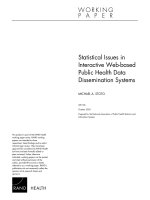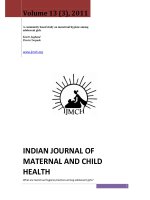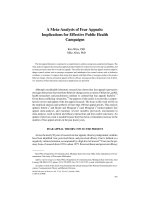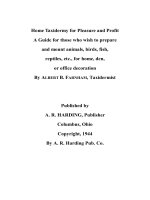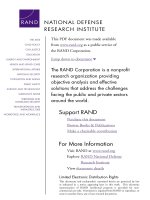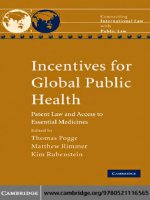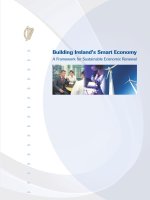INCENTIVES FOR GLOBAL PUBLIC HEALTH potx
Bạn đang xem bản rút gọn của tài liệu. Xem và tải ngay bản đầy đủ của tài liệu tại đây (3.65 MB, 536 trang )
This page intentionally left blank
INCENTIVES FOR GLOBAL
PUBLIC HEALTH
This portrait of the global debate over patent law and access to essential
medicines focuses on public health concerns about HIV/AIDS, malaria,
tuberculosis, the SARS virus, influenza and diseases of poverty. The
essays explore the diplomatic negotiations and disputes in key inter-
national forums, such as the World Trade Organ ization, the World
Health Organization and the World Intellectual Property Organization.
Drawing upon international trade law, innovation policy, intellectual
property law, health law, human rights and philosophy, the authors
seek to canvass pol icy solutions that encourage and reward worthwhile
pharmaceutical innovation while ensuring affordable access to advanced
medicines. A number of creative policy options are critically assessed,
including the development of a Health Impact Fund, prizes for medical
innovation, the use of patent pool s, Open Source drug development and
forms of ‘creative capitalism’.
thomas pogge is Leitner Profess or of Philosophy and International
Affairs at Yale University, Professorial Fellow at the ANU Centre for
Applied Philosophy and Public Ethics (CAPPE), Research Director at the
Oslo University Centre for the Study of Mind in Nature (CSMN) and
Adjunct Professor at the University of Central Lancashire.
matthew rimmer is a s enior lecturer and A ssociate Director of
Research at the ANU College of Law, and Associate Director of the
Australian Centre for Intellectual Property in Agriculture.
kim rubenstein is Profes sor and Director of the Cen tre for
International and Public Law (C IPL) a t the ANU College of Law,
Australian National University.
CONNECTING INTERNATIONAL LAW
WITH PUBLIC LAW
This series of books flows from workshops bringing public and
international lawyers and public and international policy makers
together for interdisciplinary discussion on selected topics and themes.
It aims to broaden both public and international laws’ understanding of
how these two areas intersect. Until now, international and public law
have mainly overlapped in discussions on how international law is
implemented domestically. This series is unique in consciously bringing
together public and internation al lawyers to consider and engage in each
other’sscholarship.
Series Editors
Professor Kim Rubenstein, Australian National University
Professor Thomas Pogge, Yale University
Books in the series
Incentives for Global Public Health: Patent Law and Access to Essent ial
Medicines
Edited by Thomas Pogge, Matthew Rimmer and Kim Rubenstein
Sanctions, Accountability and Governance in a Globalise d World
Edited by Jeremy Farrall and Kim Rubenstein
INCENTIVES FOR GLOBAL
PUBLIC HEALTH
Patent Law and Access to Essential Medicines
Edited by
THOMAS POGGE,
MATTHEW RIMMER
and
KIM RUBENSTEIN
CAMBRIDGE UNIVERSITY PRESS
Cambridge, New York, Melbourne, Madrid, Cape Town, Singapore,
São Paulo, Delhi, Dubai, Tokyo
Cambridge University Press
The Edinburgh Building, Cambridge CB2 8RU, UK
First published in print format
ISBN-13 978-0-521-11656-5
ISBN-13 978-0-511-75004-5
© Cambridge University Press 2010
2010
Information on this title: www.cambridge.org/9780521116565
This publication is in copyright. Subject to statutory exception and to the
provision of relevant collective licensing agreements, no reproduction of any part
may take place without the written permission of Cambridge University Press.
Cambridge University Press has no responsibility for the persistence or accuracy
of urls for external or third-party internet websites referred to in this publication,
and does not guarantee that any content on such websites is, or will remain,
accurate or appropriate.
Published in the United States of America by Cambridge University Press, New York
www.cambridge.org
eBook (NetLibrary)
Hardback
CONTENTS
Contributors viii
Series Editors’ Preface xvii
Editors’ Preface xix
Introduction: Access to essential medicines: public health and
international law 1
thomas pogge, matthew rimmer and
kim rubenstein
PART I International trade 33
1. TRIPS and essentia l medicines: must one s ize fit all? Making the
WTO responsive to the gl obal hea lth cr isis 35
rochelle c. dreyfuss
2. Th e TRIPS Waiver as a recognition of public health concerns in
the WTO 56
andrew d. mitchell and tania voon
3. Public law challenges to the regulation of pharmaceutical
patents in the US bilateral free trade agreements 77
hitoshi nasu
4. Global health and development: patents and public
interest 101
elizabeth siew-kuan ng
v
PART II Innovation 133
5. Th e Health Impact Fund: better pharmaceutical innovations
at much lower p rice s 135
thomas pogge
6. Th e Health Impact Fund: a critique 155
kathleen liddell
7. A prize system as a partial solution to the health crisis in the
developing world 181
william w. fisher and talha syed
8. Innovatio n and insuffi cient evidence: the case for a
WTO –WHO Agreement on Health Technology Safety and
Cost-Effectiveness Evaluation 209
thomas faunce
PART III Intellectual property 233
9. Opening the dam: patent pools, innovation and access
to essential medicines 235
dianne nicol and jane nielsen
10. Open Source drug discovery: a revolutionary paradigm
or a U topian model? 263
krishna ravi srinivas
11. Accessing and benefitsharingavianinfluenza viruses
through the World Health Organization: a CBD
and TRIPS compromise thanks to Indonesia’s
sovereignty cla im? 284
charles lawson and barbara ann hocking
12. Th e Lazarus Effect: the (RED) Campaign and creative
capitalism 313
matthew rimmer
PART IV Healthcare 341
13. Be yond TRIPS: the role of non-state actors a nd access
to essential medicines 343
noah benjamin novogrodsky
vi contents
14. Securing health through rights 357
katharine g. young
15. The role of national laws in reconciling constitutional right to
hea lth with TRIPS o bli gations: an exam ina tion of the Glivec
patent case in India 381
rajshree chandra
16. Ti pping point: Thai compulsory licences redefine essential
medicines debate 406
jonathan burton-macleod
Bibliography 425
Index 486
contents vii
CONTRIBUTORS
Editors
Having received his PhD in philosophy from Harva rd University,
PROFESSOR THOMAS POGGE is Leitner Professor of Philosophy and
International Affairs at Yale University, Professorial Fellow at the ANU
Centre for Applied Philosophy and Public Ethics (CAPPE), Research
Director at the Oslo University Centre for the Study of Mind in Nature
(CSMN) and Adjunct Professor at the University of Central Lancashire.
He is Editor for Social and Political Philosophy for the Stanford
Encyclopedia of Philosophy and a member of the Norwegian Academy
of Science. With support from the Australian Research Council, the
BUPA Foundation and the European Commission, he currently heads
a team effort towards developing a complement to the pha rmaceutica l
patent regime that would improve access to advanced medicines for the
poor worldwide. His recent publications include World Poverty and
Hum an Rights, 2 nd edn. 2008; Global Justice and Global Ethics, both
2008; and John Rawls: His Life and Theory of Justice and Freedom from
Poverty as a Human Right , both 2007.
dr matthew rimmer is a senior lecturer and Associate D irector of
Research at the ANU College of Law, and Associate Director of the
Australian Centre for Intellectual Property in Agriculture. He holds a
BA (Hons) and a University Medal in literature, and an LLB (Hons) from
the Austral ian National University. Dr Rimmer received a PhD in law
from the University of New South Wales for his dissertation on The
Pirate Bazaar: The Social Life of Copyright Law. He is a member of the
ANU Climate Change Institute and a director of the Australian D igital
Allliance. Dr Rimmer is the author of Digital Copyright and the
Consumer Revolution: Hands off my iPod (2007) and Inte llectual
Property and Biotechnology: Biological Inventions (2008). He edited the
viii
collection Patent Law and Biological Inventions (2006). Dr Rimmer was
a chief investigator in an ARC Discovery Project, ‘Gene Patents in
Australia: O ptions for Re form’ (2003–5), a nd an ARC Linkage Grant,
‘The Protection of Botanical Inventions’ (2003). He has published widely
on copyright law and information technology, patent law and
biotechnology, access to medicines, clean technologies an d traditional
knowledge.
professor kim rubenstein is Professor and Director of the Centre
for I nternational and Public Law (CIPL) at the ANU College of Law,
Australian National University. A graduate of the Uni versity of
Melbourne and Harvard University, Professor Rubenstein’scurrent
research projects are at the cutting edge of the intersection between
public and international law. Her public law work spans constitutional
and administrative law, and also includes her expertise in citizenship law.
Her international law work focuses on the status of nationality. Her
book, Australian Citizen ship Law in Context (2002) represents the
foundation of her continued scholarly work, looking at the disjuncture
between the exclusive legal no tion and the more inclusive normative
understanding of citizenship.
Other Contributors
jonathan burton-macleod holds a BSc from Harvard University,
alawdegreefromQueen’s University, Canada, and a Ma sters in Law from
Harvard Law School. Burton-MacLeod’s ini tial focus was biochemistry
and he worked at the Centers for Disease Control, Atlanta. In law school,
his focus remained on international health, with stu dy conducted at
the University of Cape Town Faculty of Law. His graduate law degree
focused on theories of law and society in the globalization of law,
viewed through the lens of public health. Since finishing, much of
Burton-MacLeod’s research has focused on American and comparative
Constitutional law. He was a lecturer at the ANU College of Law.
Burton-MacLeod is cur rently an Assistant Professor and Assistant
Dean (Research) at Jindal Global Law School and Assistant Director at
the Centre for Global Governance and Policy.
rajshree chandra is a Senior Lecturer a t Janki Devi Memorial
College, Delhi University with fifteen years’ teac hing experience in the
contributors ix
Department of Polit ical Science. She has completed a Masters and MPhil
from the Centre for Political Studies, Jawaharlal Nehru University (JNU)
(New Delhi), and her Doctorate is from the Centre for the Study of Law
and Governance (JNU). Her doctoral dissertation is an inquiry into the
moral pre mises of intellectua l property rights, as encompassed by the
TRIPS regime. Her research interests conc ern the impact of patent rights
on healthcare.
professor rochelle c. dreyfuss is the Pauline Newman
Professor of Law at New York University School of Law. She holds BA
(Wellesley College) and MS (University of California) degrees in
Chemistry and a law degree (Columbia Law School), and s he clerked
for Chief Judge Wilfred Feinberg of the US Court of Appeals for the
Second Circuit a nd Chief Ju sti ce Warren E. Burger of the US Supreme
Court. She is a member of the National Academy of Sciences (NAS)
Committee on Science, Technology and the Law and the National
Institute of Health’s Advisory Committee on Genetics, Health and
Society, as well as the American Law Institute, where she was Co-
reporter for its Project on Intellectual Property: Principles Governing
Jurisdiction, Choice of Law, and Judgments in Transnational Disputes.
She is a past consultant to the Federal Courts Study Committee, the
Presidential Commission on Catastrophic Nuclear Accidents and the
Federal Trade Commission. She was also a member of NAS
Committees on Intellectual Property in Genomic and Protein Research
and Innovation and Intellectual Property Rights in the Knowledge-Based
Economy.
associate professor thomas faunce (BA/LLB (Hons), BMed,
PhD) has a joint position in the ANU College of Law and Medical School
at ANU. He has directed tw o three-year ARC research projects on (1) the
impact of international trade agreements on Australian medicines policy
and ( 2) regulation of nanomedicine in Australia. He has been a
consultant for UNESCO on its global ethics and health law database
and published widely in this field. His latest book is Who Owns our
Health? Medical Professionalism, Law and Leadership beyond the Age of
the Market State (2007).
professor william fisher received his undergraduate degree
(in American Studies) from Amherst College and his graduate degrees
(JD and PhD in the History of American Civilization) from Harvard
x contributors
University. Between 1982 and 19 84, he served as a law clerk to Judge
Harry T. Edwards of the US Court of Appeals for the DC Circuit and then
to Justice Thurgood Marshall of the US Supreme Court. Since 1984, he
has taught at Harvard Law School, where he is currently the Hale and
Dorr Professor of Intellectual Property Law and the Director of the
Berkman Center for Internet and Society. His academic honours
include a Danforth postbaccalaureate fellowship (1978–82) and a
postdoctoral fellowship at the Center for Advanced Study in the
Behavioral Sciences in Stanford, California (1992–3).
associate professor barbara ann hocking is an academic at
QUT Faculty of Law. She has been a visitor at the Faculty of Law at the
University of Tasmania for two years. She is the editor of Towards a
Nexus of Law and Biology: New Ethical Challenges (2009) and was
recently awarded an Australian Linkage International Fellowship
(ARCIF) to work on intersections between avian influenza planning
and human rights. She is currently preparing a second edition of her
book Liability for Negligent Words (1999) with Scott Guy.
dr charles lawson is a senior research f ellow with ACIPA and an
associate professor at the Griffith Law School at Griffi th University. Dr
Lawson’s research interests include some aspects of intellectual property,
competition, trade, access, taxation, public and administrative law and
risk assessment and management.
dr kathleen liddell (DPhil (Oxon), LLB (Hons), BSc (Melb),
MBioethics (Monash)) is the Herchel Smith Lecturer in Intellectual
Property Law at Cambridge University and a fellow of Downing
College. Her research focuses on the legal and ethical frameworks
surrounding medical research, biotechnology and bioinformation. Her
research bene fits from funding provided by the Wellcome Trust, the
Cambridge Genetics Knowledge Park and the Sasakawa Pea ce
Foundation. It forms part of a programme of investigations organized
by the Centre for Intellectual Property and Information Law and the
CambridgeCentreforMedicalGeneticsandPolicy.
dr andrew mitchell is an Associate Professor at Melbourne Law
School. He has studied law at the University of Melbourne, Harvard Law
School and Cambridge University. In addition to his Melbourne
teaching, Dr Mitchell has taught WTO law to undergraduate and
contributors xi
postgraduate students at Bond University, Monash University and the
University of Western Ontario, and to Australian and overseas
government officials at the Australian Department of Foreign Affairs
and Trade and the International Development Law Organization
respectively. His monograph Legal Principles in WTO Disputes was
published in 2 008.
dr hitoshi nasu joined the ANU College of Law in D ecember 2006.
Prior to his appointment to the ANU, he was a part-time lecturer at
the University of Sydney, teaching inter national law. He completed a
PhD in 2006 by submitting a doctoral thesis entitled Precautionary
Approach to International Security Law: A Study of Article 40 of the UN
Charter.
associate professor elizabeth siew-kuan ng has been
teaching intellectual property law at the Faculty of Law, National
University of Singapore since 1986. She is the author of several books and
has published widely and delivered papers at numerous international
conferences on intellectual property law. She was a consultant to the
World Intellectual Property Organization (‘WIPO’), Switzerland; a visiting
scholar to the US Court of Appeal for the Federal Circuit, Washington
DC; and tutor in IP law of the WIPO Worldwide Academy, Switzerland.
She served on many national and international projects to advise on
intellectual property laws. Professor Ng regularly gives opinions on
intellectual property law to clients in the public and private sectors. She
holds an LLB (Hons) from the University of London and an LLM (First
Class) from the University of Cambridge. She was awarded the Sweet &
Maxwell Law Prize (1981) and the Faculty of Law prize (1983) from the
University of London and the Clough prize (1984) from the University of
Cambridge. She is also a barrister-at-law of the Middle Temple, England, an
advocate and solicitor of the Supreme Court of Singapore, a fellow of the
Cambridge Commonwealth Society, University of Cambridge and Team
Leader (Information Communication Technology section) of the East Asian
International Economic Law and Policy ICT Research Network of the
University of Hong Kong.
professor dianne nicol is a professor in the Law Faculty at the
University of Tasmania and a deputy director of the Centre for Law and
Genetics (CLG), a cross-institutional research group based at the
xii contributors
University of Tasmania and Melbourne University. She teaches in the
areas of intellectual property law, eq uity, media law, IT law and
biotechnology and the law. She is Assoc iate Dean for Research in the
Law Faculty and Graduate Resea rch Co-ordinator. She is also Chair of
the University Animal Ethics Committee. Her research focuses on
intellectual property issues in health and biotechnology, particularly on
use of patented inventions.
dr jane nielsen is a lecturer in law at the Law Fac ulty, University
of Tasm ania. Dr Nielse n’s primary research interests concern the
intersection of intellectual property and competition law, particularly
as these issues pertain to the medical biotechnology industry. Dr Nielsen
completedherPhDthesisinthisareaandhaspublishedanumberof
related papers. She also has an interest in the issue of compulsory
licensing and its role in ensuring access to technologies. Her current
project is to consider the role of patent poo ling in facilitating
access to, and distribution of, key biotechnology research tools and
technologies.
professor noah novogrodsky is an associate professor at the
University of Wyoming law school and the former head of the
International Human Rights Program at the University of Toronto
Faculty of Law. Professor Novogrodsky has been a visiting professor at
Georgetown University Law Center and a Schell fellow at Yale Law
School. Professor Novogrodsky holds a BA degree from Swarthmore
College (Political Science and English Literature), an MPhil Degree in
International Re lations from Cambridge University and a Ju ris Doctor
from Yale Law School. Professor Novogrodsky’s current research
agenda focuses on the impact of AIDS trea tment on the fi eld of human
rights law.
dr krishna ravi srinivas is an associate fellow with RIS
researching intellectual property rights and trade and environment
issues. He holds a PhD from National Law School University,
Bangalore. He has been a visiting scholar on a Fulbright Fellowship
at th e Law Sch ool, University of Pennsylvania, a visiting scholar at
the Law School, Indiana University, Bloomington, a post-doc fellow
at the South Centre, Geneva and a member of Visiting Fa culty at
IIM-Bangalore. His articles have been published in, inter alia,
contributors xiii
Economic & Political Weekly, EOLSS Encyclopaedia, Environmental
Politics, International Social Science Journal and Asian Journa l of
WTO & Internation al Health Law and Policy. His research interests
include use of Open Source models in biodiversity, drug discovery/
development, biodiversity/biocommons and intellectual property
rights.
talha syed is an Assistant Professor at the University of California,
Berkeley Law School, where he teaches and researches on intellectual
property (with a focus on patents), torts, health law and legal theory. He
has a BA (Hons) from the University of Western Ontario, an LLB (gold
medallist) from the University of Victoria and is an SJD (doctoral)
candidate at Harvard University. His academic honours include an
Academic Fellowship from the Petrie-Flom Center for Health Law
Policy, Biotechnology and Bioethics at Ha rv ard Law S chool, re searc h
awards from the Weatherhead Center for Justice, We lfare and
Economics at Harvard University and the Social Science and
Humanities Research Council of Canada, and se veral Certificates for
Distinction in Teaching from Harvard College.
dr tania voon is an assoc iate professor at Melbo urne Law School
and a former legal officer of the Appellate Body Secretariat of the
World Trade Organization (‘WTO’). She has previously practised
law w ith Mallesons Stephen Jaques and the Australian Government
Solicitor and ta ught law at Monash University, Bond University and
the University of Western Ontario. She completed her PhD at the
University of Cambridge and her LLM at Harvard Law School. Her
book, Cultural Products and the Wo rld Trade Organization,was
published in 2 007.
katharine young is a research fellow at the Regulatory Institutions
Network at ANU. S he earned her BA and LLB (Hons) from the
University of Melbourne and an LLM at Harvard Law School. She was
an SJD candidate at Harvard Law School where she held a graduate
fellowship at the Edmond J. Safra Foundation Center for Ethics. She
has served as Consultant Scholar at the NYU S chool of Law’sCenterfor
Human Rights and Global Justice, as Assistant to the Project Director
of Health Rights and Ghana’s Poor for Harvard Law School and the
Fulbright Foundation, and as a graduate fellow at H arvard University’s
Project on Justice, Welfare and Economics. In 2001, she was Associate
xiv contributors
to Justice Michael Kirby in the High Court of Australia . Her current
fields of research include comparative constitutional law, law and
development, law and economics, and international human rights. Her
scholarly publications include ‘The Minimum Core of Economic and
Social Rights: A Concept in Search of Content’ in the Yale Journal of
International Law (2008).
contributors xv
SERIES EDITORS’ PREFACE
TheideaforthisseriesbeganinJune2005whenKimRubensteinapplied
for the position of Professor and Director o f the Centre for International
andPublicLawattheANUCollegeofLaw.TheCentreisrecognizedas
the leading Australian academic centre bringing together public lawyers
(constitutional and administrative law broadly, but also specificareasof
government regulation) and international lawyers from around the
world. Established in 1990 with its inaugural director Professor Philip
Alston, the impact of the Centre and its w ork can be seen further at
law.anu.edu.au/cipl/.
In discussing with the law faculty ideas for the Centre’s direction, Kim
raised the concept that underpins this series. Each volume flows from
workshops bringing public a nd international lawyers and public and
international policy maker s together for interdis ciplinary disc uss ion on
selected topics and themes. The workshops attract both established
scholars and outstanding early scholars. At each of the workshops
participants address specific questions and i ssues, developing each
other’s understandings and knowledge about public and international
law and policy and the links between the disciplines as they intersect with
the chosen subject. These papers are discussed and reviewed at the
workshop collabor atively. After the workshop the papers a re finalized
for the editing phase for the overall manuscript.
The s eries seeks to broaden both pub lic law and international laws’
understanding of how these two areas intersect. Until now, inter-
national and public law have mainly overlapped in discussions on
how international law is implemented domestically. While there is
scholarship developing in the area of global administrative law, and
some scholars have touched upon the principles relevant to both dis-
ciplines, the publications to date contain only a subset of the concept
underpinning this series. This series is unique in consciously bringing
together public and international lawyers to consider and engage in
each other’sscholarship.
xvii
Beyond the first topic of sanctions, the other four topics in the series
(including this second volume on health), draw from the research themes
underpinning the International Alliance of Research Universities
(‘IA RU ’) which is made up of the ANU, Berkeley, University of
Cambridge, University of Copenhagen, ETH Zurich, National
University of Singapore, Oxford University, Peking University, the
University of Tokyo and Yale. The remaining three topics and volumes
will be around environment, movement of people and security.
The Alliance has also supported the funding of participants from the
IARU in some instances so that they can attend in person at the ANU.
This does not preclude non-IARU academics from participating, as will
be seen in the rich array of participants in the first two volumes.
After t he first successful workshop was complete, Professor
Rubenstein contacted Professor Thomas Pogge to co-host the second
workshop and, in addition to doing t hat, he has enthusiastically joined
with Professor Rubenstein as a joint series editor. His contributions to
each volume are an expression of his cosmopolitan outlook, which is a
theme engaged with throughout the series.
Kim Rubenstein
and
Thomas Pogge
June 2009
xviii series editors’ preface
EDITORS’ PREFACE
As explained in the Series Editors’ Preface, this series is a result of
workshops bringing together public and international lawyers. From
this second volume onwards, the topics revolve around the
International Alliance of Research Universities’ (‘IARU’)thematic
research topics.
When Kim Rubenstein began thinking about organizing the second
workshop around the theme of health, she was encouraged to c ontact her
ANU colleague Thomas Pogge in the Centre for Applied Philosophy and
Public Ethics. Thomas responded enthusiastically and work began to
brainstorm the call for papers.
This second workshop was e ntitled: ‘Incentives for Global Public
Health: Patent Law and Acce ss to Essential Medicines. ’ This title is
inspired by Professor Pogge’s research programme, which explores
institutional mechanisms that would create addition al incentives to
develop e ssential medicines while also ensuring real access to the result-
ing new products even for the world’s poorest populations.
This topic provides excellent material for the themes the series is
meant to explore. A majority of hum an beings are endangered by serious
diseases for which advanced medicines are either not be ing d evelo ped at
all or are inaccessible to them. To explain this huge healthcare defi cit, we
must study the relevant parts of international and public law together
and examine their interplay. To judge these national and international
rules – and those who formulate, promulgate and enforce them – we
need to relate these rules to internationally recognized human rights and
ask, for example, whether it is not a violation of human rights legally to
prevent generic manufacturers from supplying essential medicines
cheaply to poor patients. To lift, through institutional reforms, the
great disease burden from the world’s poor, we need to take a broadly
holistic approach that takes advanta ge of the fact that innovation is cost-
free at the margin: the cost of pharmaceutical R&D is the same regardless
of whether access to its products is confined to the af fluent or extended to
xix
all. The existing regime of national and international intellectual prop-
erty rules can then be criticized not merely as immoral, but also as
irrational insofar as there are great c ollective bene fits to be unlocked
through a more efficien t system of rules governing pharma ceutical
innovation.
Our workshop took place on 26–28 May 2008 at the Australian
National University. The twenty paper presenters and a further eleven
participants, who had read all the papers, enjoyed vigorous discussion,
engaging fully with each other and the material. We thank Professor
Simon Bronitt, former Director of ANU’sNationalEuropeCentre,for
providing us with a dynamic venue. We thank Chikosa Banda, Clancy
Kelly, Dr Luigi Palombi and Antony Taubman for presenting stimulating
papers at the workshop even though they were unable to c ontribute to
the r esulting book. Dr Kieran Donaghue, Professor Peter Drahos,
Associate Professor Anna George, Dr Ian Heath, Dr Janet Hope,
Professor Sarah Joseph, Teresa Lawler, HafizAzizurRehman,Dr
Michael Selgelid, Professor Judy Whitworth and Renata Zanetti either
participated in discussions or chaired various sessions and we thank
them for their valuable contributions to the workshop. The event was
ably organized by the redoubtable Kavitha Robinson.
The call for abstracts was sent out to the Law Deans of the IARU and
we thank the respective universities for their support to their participants
(in particular Cambridge University for supporting Chikosa Banda’s
travel and the National University of Singapore for supporting
Elizabeth Siew-Kuan Ng’s travel), and to the ANU, IARU secretariat
for its support in covering the IARU participants’ costs at the ANU. This
was in addition to other financial s upport from the ANU, including the
Vice Chancellor’s travel fund in supporting Professor Dreyfuss and
Professor Novogrodsky’s participation and the remaining expenses
which were split evenly between the Centre for International and
Public Law and the Centre for Applied Philosophy and Public Ethics.
We are also grateful to Teresa Lawler, who was a CIPL intern at the
time of the workshop and continued t o help us develop the resulting
papers. Special thanks are due to Trevor Moses for th e e ffort he has put in
for both volumes in the series, providing outstanding support, particu-
larly in the final stages of b ringing the entire volume together. We thank
him immensely! We also thank Jennifer Braid from the ANU College of
Law for her assistance in the early stages of putting this volume together,
before she moved from the ANU to work at the High Court of Australia.
Matthew Peterson also provided sterling research assista nce. Kim and
xx editors’ preface
Thomas thank their co-editor Matthew for doing the lion’s share of the
day-to-day managing of the project.
And all three of us thank the staff at Cambridge University Press, and
especially Finola O’Sullivan for her enthusiasm in getting this volume
and series off the ground. We are grateful for Kate Ollerenshaw’simpec-
cable copy-editing.
Finally, we would like to thank our colleagues at the ANU College of
LawandtheCentreforAppliedPhilosophyandPublicEthicsandour
respective families and friends for their support and inspiration in all
that we do.
Thomas P ogge,
Matthew Rimmer
and
Kim Rubenstein
June 2009
editors’ preface xxi
Introduction
Access to essential medicines: public health
and internat ional law
thomas pogge, matthew rimmer
and kim rubenstein
1. Prologue
Historically, there have been intense conflicts over the ownership and
exploitation of pharmaceutical drugs and diagnostic tests dealing with
infectious diseases.
Throughout the 1980s, there was much scientific, legal a nd ethical
debate about which scientific group should be credited with the discovery
of the human immunodeficiency virus and the invention of the blood test
devisedtodetectantibodiestothevirus.
1
In May 1983, Luc Montagnier,
Françoise Barré-Sinoussi and other French s cientists from the Institut
Pasteur in Paris published a paper in Science,detailingthediscoveryofa
virus called lymphadenopathy (‘LAV’).
2
Ascientific rival, Robert Gallo
of the National Cancer Institute, identified the AIDS virus and published
his findings in the May 1984 issue of Science.
3
In May 1985, the United
States Patent and Trademark Office awarded the American patent for the
AIDS blood test to Gallo and the Department of Health and Human
Services. In Decembe r 198 5, the Institut Pasteur sued the Department of
Health and Human Services, conte nding that the French were the first to
1
Hal Hellman, ‘Chapter 10, Gallo versus Montagnier, the AIDS War’, Great Feuds in
Medicine: Ten of the Liveliest Disputes Ever (2001), 165–84.
2
Françoise Barr é-Sinoussi, ‘Isolatio n of a T-lymphotropic Retrovirus from a Patient at
Risk for Acquired Immune Deficiency Syndrome (AIDS)’ (198 3)220Science 868–71 .
3
Robert Gallo et al. ‘Frequent Detection and Isolation of Cytopathic Retroviruses (HTLV-
III) from Patients with AIDS and at Risk f or AIDS’ (1984)224Science 500–3;
J. Schupbach et al. ‘Serological Analysis of a Subgroup of Human T-lymphotropic
Retroviruses (HTLV-III) associated with AIDS’ (1984)224Science 503–5; and
Mangalasseril G. S arngadharan et al. ‘Antibodies Reactive with Human T-lymphotropic
Retroviruses (HTLV-III) in the Serum of Patients with AIDS’ (1984)224Science 506–8.
1
